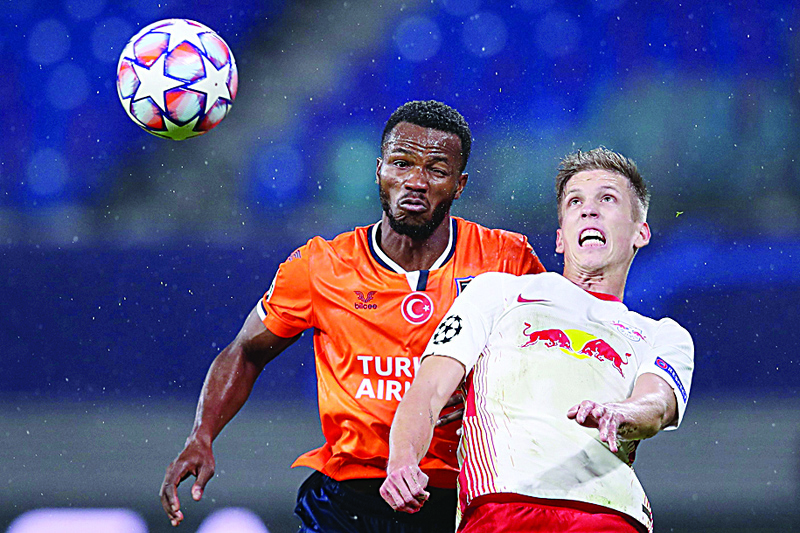
ISTANBUL: Newcomers Istanbul Basaksehir face a tough baptism in the Champions League after shaking up the Turkish football hierarchy and earning a reputation as the plaything of President Recep Tayyip Erdogan. Basaksehir earned their place in Europe's elite club competition by pipping Turkey's traditional giants to win the title for the first time. They could scarcely have asked for a harder draw as a reward. They host Paris Saint-Germain today after losing 2-0 to RB Leipzig last week. After that they play Manchester United home and away.
A win against PSG, last season's runners-up, would be symbolic beyond the pitch at a time when Ankara and Paris are locked in a diplomatic stand-off over Islam and freedom of speech. Basaksehir's title triumph was coming after they finished second in 2017 and 2019. Yet their rise has been remarkable. The achievement stands out given the traditional dominance of Turkey's Super Lig by Istanbul's big three of Fenerbahce, Galatasaray and Besiktas. Between them, that trio had won all bar one of the previous 35 titles, with the exception being Bursaspor in 2010.
Links to power
For their detractors, Basaksehir owe their success to the support of the government and the financial clout of companies close to the ruling Islamist-rooted AKP party of President Erdogan. The close relationship between the club and the Turkish leader is such that rival supporters have labelled Basaksehir "FC Erdogan". Created in the 1990s by the municipality of Istanbul, the club was sold in 2014 to a consortium of businessmen reputedly close to Erdogan. The club's main backer is Medipol, a group of private hospitals run by Turkey's health minister. The club is based in the district of Basaksehir in the European part of Istanbul, far from the heart of the sprawling city.
The modern high-rise suburb is seen by Erdogan as a showcase for the conservative "new Turkey" that he has promoted. Following the 2014 takeover a 17,000-capacity stadium was built, named after the legendary former player and manager Fatih Terim, who ironically manages Galatasaray. Erdogan blessed the club's new look when in July 2014 he donned Basaksehir colours to play in a charity game at the new stadium and scored an improbable three goals in 15 minutes.
In a country where football, business and political power are intricately linked, the creation of the modern Basaksehir, a year after the widespread "Gezi Park" anti-government protests in which "ultra" supporters of different Istanbul clubs played a key role, had clear political undertones. "During the Gezi Park protests, they (the government) could see the political power of the supporters. Basaksehir is a project aimed at creating a club under their control," said one Besiktas ultra who wished to remain anonymous for fear of losing his job in the civil service.
'The old system is broken'
But beyond their links to power, Basaksehir owe their success to a strict economic model which is in stark contrast to the country's traditional giants whose elected presidents are compelled to spend, sometimes recklessly, to satisfy demanding supporters. "The major Istanbul clubs are in financial ruin after being run into the ground by presidents and boards who come, leave and rarely put anything back into the club," says Emre Sarigul, co-founder of the website Turkish Football.
"The old system is broken. Basaksehir are run in what can be described as a more modern, corporate-minded, accountable system and it is no surprise they are doing so well. "They are perhaps the only professionally-run club in the top tier with a long-term strategy." Huseyin Avcilar, who co-runs the supporters group Basaksehir 1453, says their success can also be put down to "a tailor-made transfer policy". While Fenerbahce, Galatasaray and Besiktas have splashed the cash to sign foreign stars who are past their peak, Basaksehir's squad is a mix of local talent, like Irfan Can Kahveci, and unearthed treasures like the Bosnian Edin Visca.
There are some foreign veterans, though, with the Brazilian ex-Manchester United full-back Rafael recently arriving from Lyon to join Demba Ba and Nacer Chadli. Yet it would be a stretch to call Basaksehir the fourth giant of Istanbul. Before coronavirus restrictions, their stadium was rarely more than a quarter-full. After winning the league in July, the team paraded through Basaksehir, but the streets were deserted. "It will take a huge effort for Basaksehir to build a football culture and become accepted as a genuine rival to the big three," says Sarigul. "It would take at least a generation to build up any sort of support."- AFP




